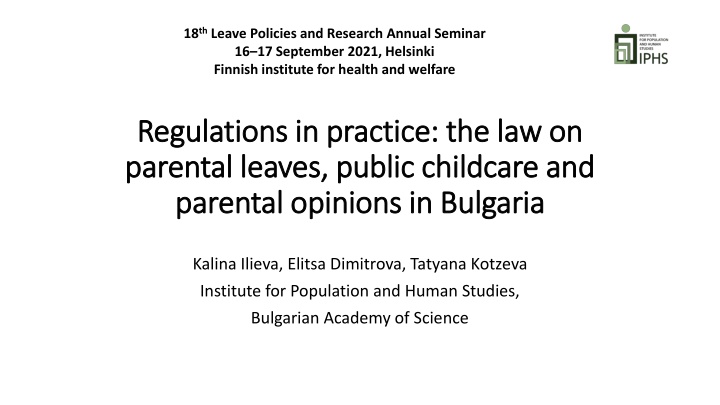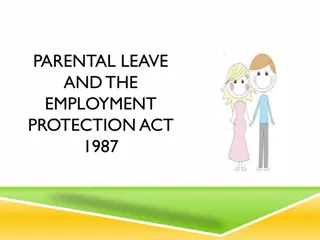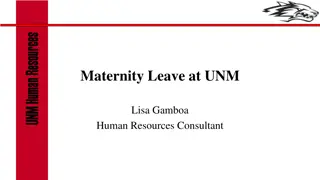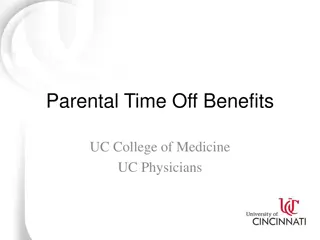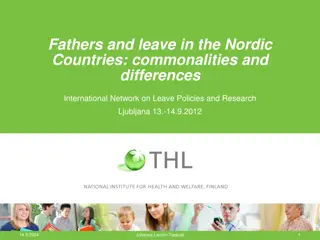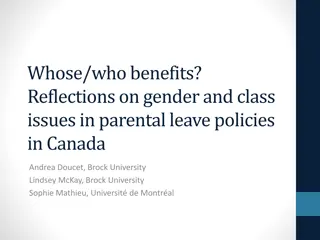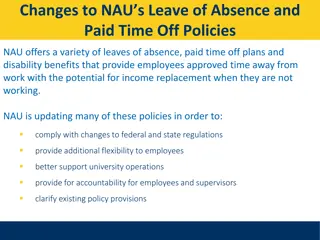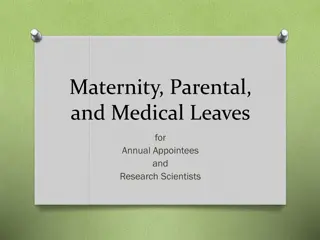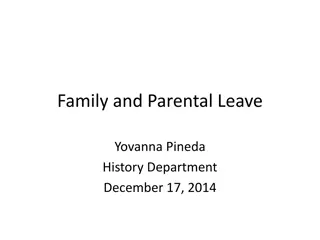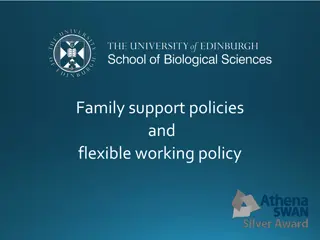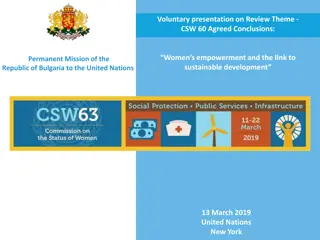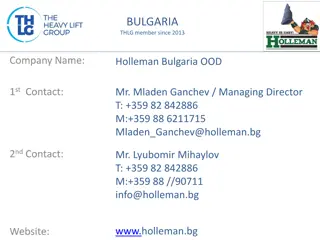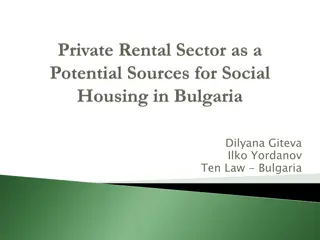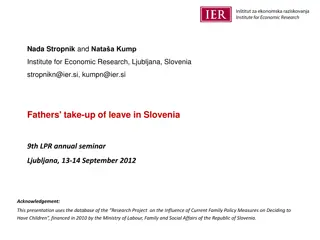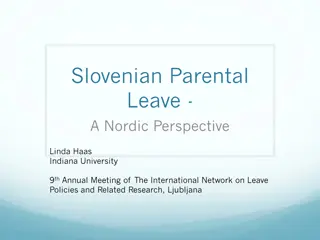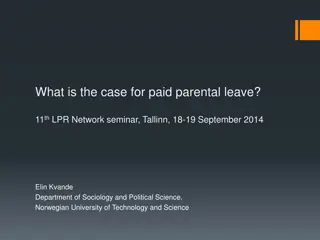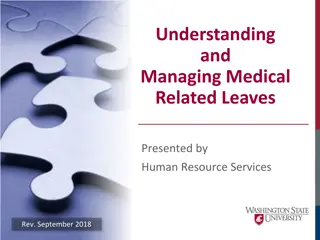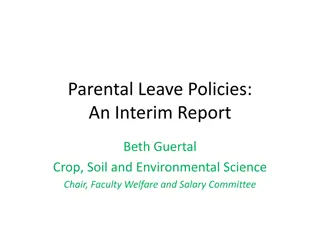Evolution of Parental Leave Policies in Bulgaria: A Historical Overview
Explore the transformation of parental leave policies in Bulgaria from the socialist era to the modern EU influence. The seminar delves into the progression of rights and entitlements for parents, inclusive of various family structures and dynamic societal needs. Key topics include paid parental leave, childcare provisions, and recent developments in maternity and paternity benefits.
Download Presentation

Please find below an Image/Link to download the presentation.
The content on the website is provided AS IS for your information and personal use only. It may not be sold, licensed, or shared on other websites without obtaining consent from the author.If you encounter any issues during the download, it is possible that the publisher has removed the file from their server.
You are allowed to download the files provided on this website for personal or commercial use, subject to the condition that they are used lawfully. All files are the property of their respective owners.
The content on the website is provided AS IS for your information and personal use only. It may not be sold, licensed, or shared on other websites without obtaining consent from the author.
E N D
Presentation Transcript
18thLeave Policies and Research Annual Seminar 16 17 September 2021, Helsinki Finnish institute for health and welfare Regulations in practice: the law on Regulations in practice: the law on parental leaves, public childcare and parental leaves, public childcare and parental opinions in Bulgaria parental opinions in Bulgaria Kalina Ilieva, Elitsa Dimitrova, Tatyana Kotzeva Institute for Population and Human Studies, Bulgarian Academy of Science
SCOPE OF THE PRESENTATION A SHORT HISTORICAL OVERVIEW OF THE POLICY ON PAID PARENTAL LEAVES AND ECEC RECENT DEVELOPMENTS A SURVEY ON YOUNG MOTHERS ATTITUDES TOWARDS PAID PARENTAL LEAVES AND CHILDCARE 2
Context Sources: National Statistical Institute; Eurostat. 3
The social state ideology and priorities The socialist state (1944-1989) institution of rights around pregnancy and childbirth, pronatalistic policy AND high women s employment, a wide network of cr ches and kindergartens, other social advantages for families with children 1990s inflation of social payments, incl. maternity compensation, expansion of low-paid parental leave, cut off of kindergartens After 2000 onset of EU legislation transposition in national law, recognizing diversity of parental contexts, expansion of well-paid maternity leave 4
Recent developments in Maternity/Parental leaves The pronatalistic logic of parity-based entitlements gradually removed Progressively inclusive of other persons 1styear (well-paid) leave Fathers (2009) Grandparents (2017) Adoptive parents are treated equally to birth parents (2018) Lone adoptive mother/father the same rights as couples Foster families entitlements Parental leave (2004) Maternity/Parental leave not fully aligned with biological (2017) Right of 50% maternity/parental benefit if the mother returns to work before ending of leave (2017) 6
The fathers entitlements Paternity leave 15 calendar days at birth (2009) Incl. cohabiting fathers (2017) Excl. adoptive cohabiting fathers (2018) Maternity/parental leave (after the 6thmonth of the child) Birth and adoptive fathers (2009) Foster fathers (2017) Paid parental leave (between the 1stand 2ndyear of the child) Birth and adoptive fathers (1986) Foster fathers (2004) Use of paternity leave 21 749 fathers (~30%) in 2020 Use of transferred maternity leave after the 6thmonth 342 fathers in 2020 7
Trends and Developments in ECEC Due enlargement of the ECEC sector 10,000 without childcare places in 2020 A new compensation for parents whose children 3-6 y. do not have a place in a public kindergarten (~ 180 per month) Rigid forms of public ECEC services only collective, medicalized discourse , quality framework to be developed Geographical variation in provision and in attendance rates unmet demand in large cities and the capital Lack of state-regulated individual forms municipal or market-based Share of informal unpaid care cultural norms to use grandparents 8
Some implications The rule for determining maternity compensation penalizes the situation of job insecurity in case of gaps in work experience filled with the minimum wage Mean mother s vs. father s compensation for maternity/parental leave - BGN32.74 vs. BGN62.97(daily) in 2020 economic disincentive for families to use the transferred maternity/parental leave The employer s prism long absence of mothers from work since maternity or parental leaves cannot be split and postponed Co-resident non-biological parents are not entitled the right of leave and also a cohabiting father is eligible for paternity leave if he has formally acknowledged the child 9
A survey on parental attitudes to ECEC Data collection February, 2017, online form Non-random sample of 748 parents: mothers (98%), fathers (2%) one child (53%), two children (42%), three or more (5%) median age 35 residence: capital (50%), big city (32%), small town (15%), village (4%) education: higher (81%), secondary (18%), primary (1%) employed (59%), on maternity leave (30%), unemployed (9%), in edu (2%) income brackets: low (21%), medium (42%), high (37%) 10
Policy changes and parental attitudes p<0.02 Open-ended question: both propositions, underlining choice 11
Policy changes and parental attitudes Open-ended question: useful yes, necessary - no 12
Parental experiences use of paid leave Have you used parental leave: p<0.001
Survey findings Ambivalent attitudes towards the length of parental leave, education gradient Mothers tend to use their entitlements; fathers much lower rates A father s quota within the well-paid period may be a bonus, but should not affect or be conditioned on the mother s rights Hidden regulations in private sector women with secondary education are not eager to take sick leave Preference for home-based childrearing for very young children 16
Conclusions The law: entitlements of well-paid leave (during the 1styear) are mother- centered , non-use of the transferable portion after the 6th month A gap between law regulations and practices As the length of maternity leave extends in time full use and slow reentry of mothers into the labor market The ECEC sector: the lack of individual forms for ages 0-3 is backed up with informal care by grandparents, or, with Individual market-based care expensive, unregulated for quality and affordability for parents (uncapped fees) The parents: still underserved due to shortage of places in big cities Hidden norms for non-absence from work for family reasons A field to be developed individual forms of childcare 17
Sources & literature: Eurostat (online data codes: demo_find, T2020_10) National Statistical Institute. Statistical Yearbook, 1981, 1986, 1991, 2003, 2006, 2010. National Statistical Institute. Infostat on-line database. [Accessed: 22.08.2021] Dimitrova, E., Kotzeva, T. and Ilieva, K. (2021) Bulgaria country note , in Koslowski, A., Blum, S., Dobroti , I., Kaufman, G. and Moss, P. (eds.) International Review of Leave Policies and Research 2021. Available at: https://www.leavenetwork.org/annual-review- reports/ Mruchkov, V. (1978) The Bulgarian labour legislation and the international labour conventions and recommendations. Nauka I izkustvo Publ. Sofia. (In Bulgarian) Yossifov, Y., Banova, V., Zhupunov, L., Marinova, A., Kotzeva, T., Dimitrova, E., Moraliiska, St., Ilieva, K., Gerginova, E. (2018) Early Childhood Development in Bulgaria: Views from Inside. A Study of the Systems Supporting Early Childhood Development, their Interconnections and the Interactions with Parents. Sofia, For Our Children Foundation (in Bulgarian). 18
